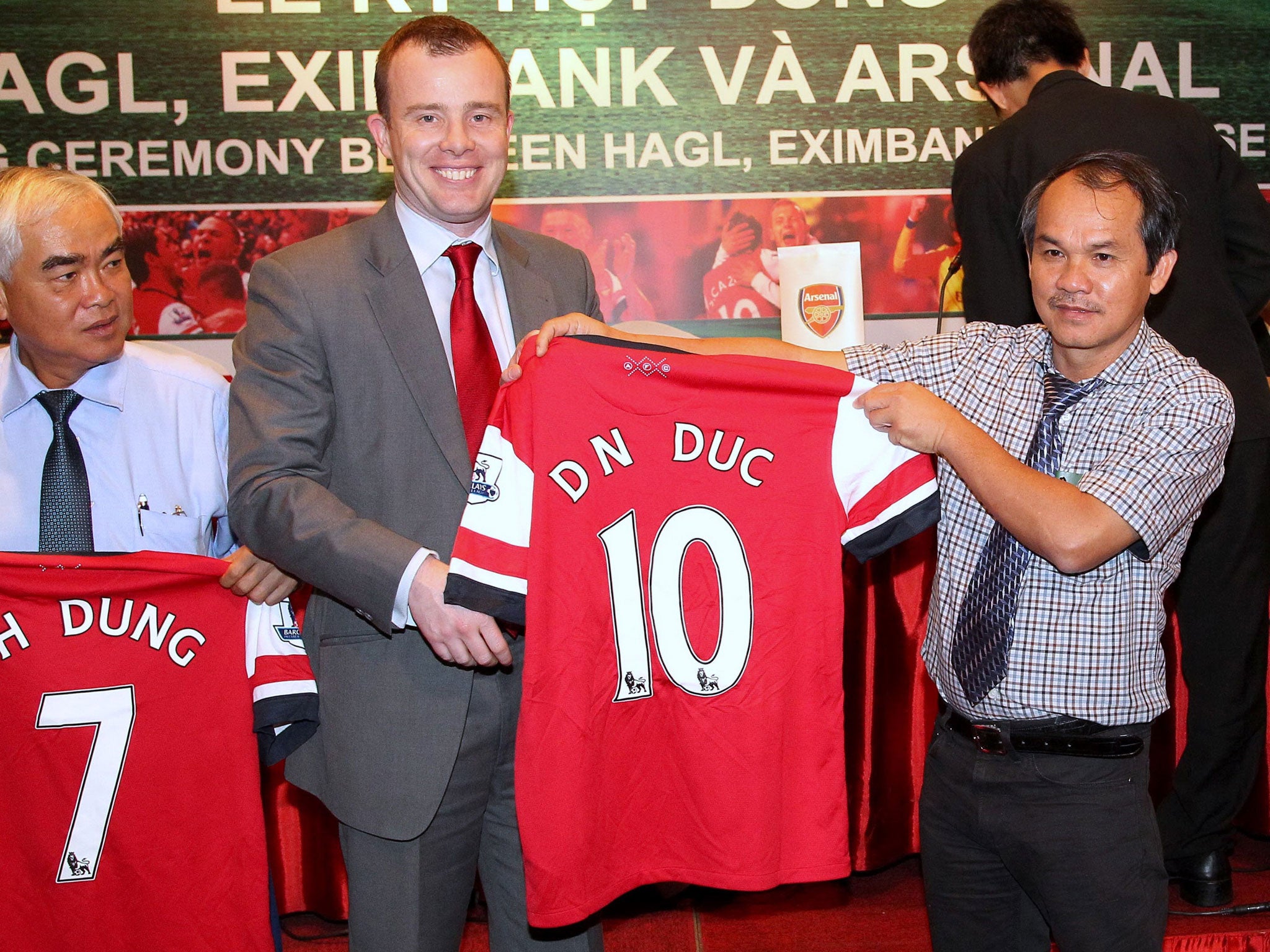Jim Armitage: Doan Nguyen Duc, the Vietnamese Arsenal fan and the land grab claims
Blog raises serious concerns over Gunners’ partnership with the tycoon’s company

It’s not too often that I’m alerted to stories for this column by football fans, but in the case of Vietnamese billionaire Doan Nguyen Duc, an Arsenal blog was the prompt. The piece referred to the Gunners’ partnership with the tycoon’s company, called HAGL, and expressed serious concerns as to whether the club should be involved.
Why? Because of its alleged activities logging rainforests, forcing farmers off the land and replanting with rubber trees over vast tracts of Cambodia and Laos.
Doan Nguyen Duc, more snappily known as Bau (meaning Big Boss) is, indeed, a very big boss indeed. From humble beginnings as a carpenter, he has made himself probably the richest man in the region.
Boasting all the trappings of a western billionaire, he has bought himself a football club, was the first Vietnamese to buy a private jet, and enjoys a life of five-star luxury in the hotels where he lives for most of his time.
Questions have arisen about how he became so dramatically wealthy so quickly. It is known that he was involved in the timber industry in the 1990s at a time of rampant deforestation in Vietnam. Although he disputes any illegal activity, he painted a vivid picture of his business strategy in a Forbes interview a few years back, when he declared: “I think natural resources are limited, and I need to take them before they’re gone.”
Refreshingly honest, if nothing else.
But a new report has shone an extremely grim light on the Big Boss’s activities in the neighbouring South-East Asian countries of Laos and Cambodia. There, according to Global Witness, HAGL has been one of the main participants in a land grab that has seen tens of thousands of hectares of land gobbled up and turned into rubber plantations.
Much of that was land used by local people, often for subsistence farming. A lot was forest, on which they relied for food and medicine. The report is full of tales from local villagers of being forced off their land and being unable to feed themselves.
As one villager put it: “The company just came and invaded us. It’s similar to the past, when our enemies invaded our villages.”
As Global Witness says: “Often, the first time people learn of a plantation is when the company bulldozers arrive to clear their farms.”
HAGL and the state-owned Vietnam Rubber Group have together bought more than 200,000 hectares of land from the Laotian and Cambodian governments. Those deals are extremely opaque and difficult to track, given the use of a plethora of companies and offshore vehicles. While HAGL accepts it has bought more than 46,000, it says it is unaware of any disputes with locals and says it always acts within the law.
According to the report, the two companies “operate with complete impunity, devastating local livelihoods and the environment in the process”.
Plantation development on this scale cannot be done with Vietnamese capital alone. Western investment was needed too. So, step forward Deutsche Bank, which owns indirect stakes in both companies.
Perhaps more troublingly, the World Bank has also been supporting their activities, arguing that the plantations bring investment to the countries.
And guess where you can go if you want to invest in the Big Boss’s business? Surprise surprise, that home to such charming mining companies as ENRC, Glencore Xstrata and Vedanta, the London Stock Exchange.
HAGL’s prospectus for investors in the London flotation has fulsome warnings of the inherent risks to investors.
Some of HAGL’s ”existing projects are being developed without necessary government approvals, permits or licences”, adding that “development and operation of certain projects are not fully in compliance with applicable laws and regulations”.
And perhaps most tellingly: “The construction and operations of real estate, rubber plantation, iron ore mining, hydropower production, and furniture and granite manufacturing in a number of countries has faced opposition from the local communities where these sites are located.”
But, where do the Gooners come into all this? As well as being the club’s main distributor for merchandise in Vietnam, Duc is a keen Arsenal fan and has been photographed regularly with his hero, Arsene Wenger. HAGL has advertised at Arsenal games and Duc has even persuaded the club to play a friendly in Vietnam in the summer.
So far, the boardroom at the Emirates has been happy to take Duc’s money and connections in the fast-growing economies of South-East Asia. Arsenal said it was unaware of the allegations against HAGL, but would now be seeking its response to the Global Witness report. Many among the Arsenal faithful, however, seem distinctly unimpressed.
Join our commenting forum
Join thought-provoking conversations, follow other Independent readers and see their replies
Comments